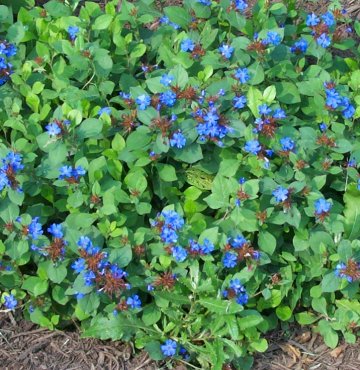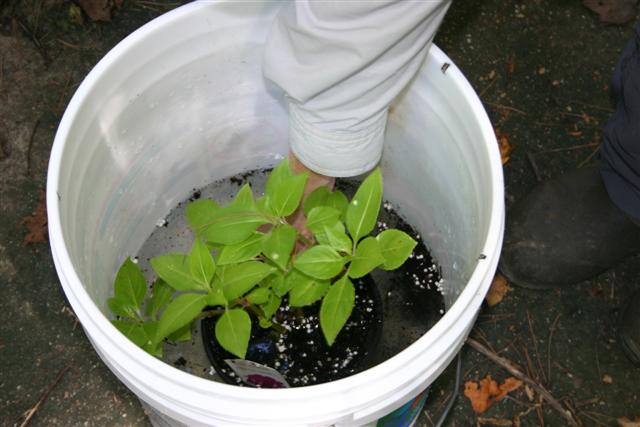Pike's Pick for October 4, 2008
|

|
Leadwort or Hardy Plumbago
Ceratostigma plumbaginoides

On sale this Saturday and Sunday (October 4th and 5th) for 20% off
at your local
Pike Nurseries
with locations around metro Atlanta.
Species Native Range: China
Hardiness: USDA Zones: 6-9
Mature Size: 6-9 inches tall and 24 inches wide, spreading
Exposure: Full sun to light shade
Soil: Well-drained
Drought Tolerance: Excellent
Ease of Culture: Easy
Hardy plumbago is a semi-evergreen, aggressively fast spreading ground cover that blooms with bright blue 1/2 inch phlox-like
flowers from summer until frost. In fall, the foliage changes to a burgundy/crimson color while the plant continues to
bloom.
Grow plumbago in full sun to light shade in soil that is rich in organic material and well-drained. This plant also performs
well in containers. It can be planted in rock gardens, at the forward edge of a bed, atop retaining walls or anywhere that a
draping or ground cover plant is desired. Prune back in early spring to remove tattered foliage and to keep the plant in bounds.
Good companion plants include color guard yucca, lantana, salvia, sedum, roses, ornamental herbs and other late-season flowering
shrubs and perennials. Deer resistant.
Planting During Drought
Although we currently have restrictions on outdoor watering, it's still possible to
install and water new plants if you apply for a
permit (online here - cost $4.95) or at
your local Pike Nursery.
To install new plants,
fill a 5-gallon bucket (or larger, if needed) with water to a depth that will be above the top of the plant's container. Place the
new plant (while still in the nursery pot) into the bucket. Allow the semi-submerged plant to remain there for several minutes.
Remove the drenched plant from the bucket and plant in soil that is well-amended with organic material (compost, soil
conditioner, etc.). Add a 2-3 inch layer of organic mulch
(pine straw, shredded hardwood, shredded leaves, etc.)
after planting. If it fails to rain, apply one inch of water to your
plants once each week until we get our first hard frost.

Soak new plants in water before planting
Copyright © 2008 by Theresa Schrum - All rights reserved
No part of this website may be reproduced without the expressed written permission of Theresa Schrum



